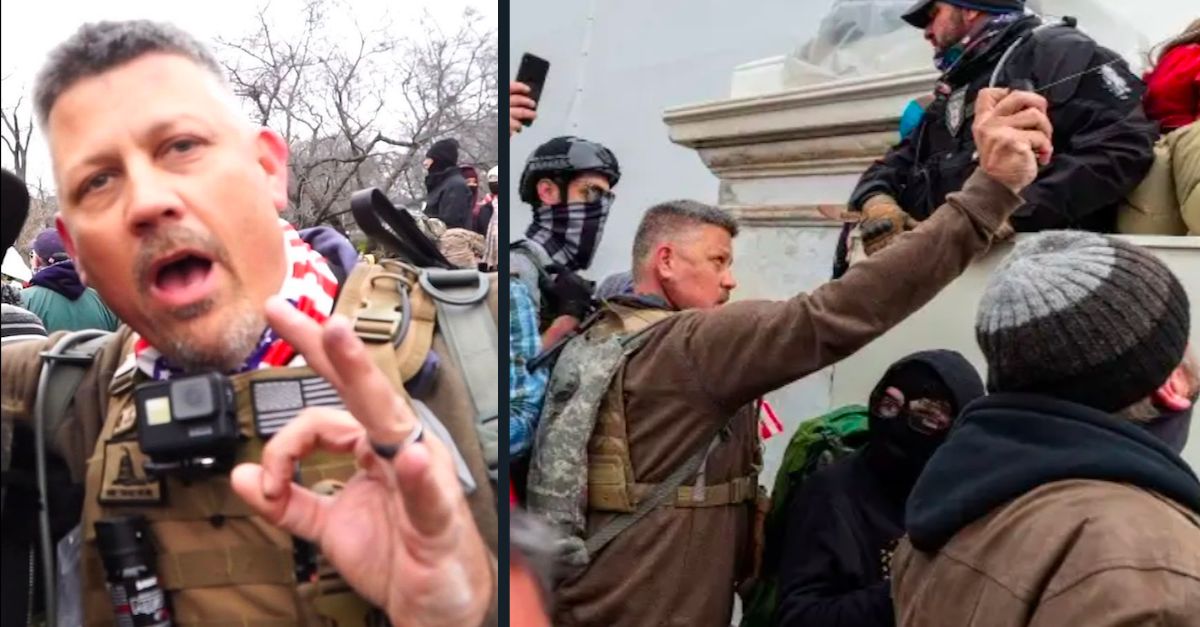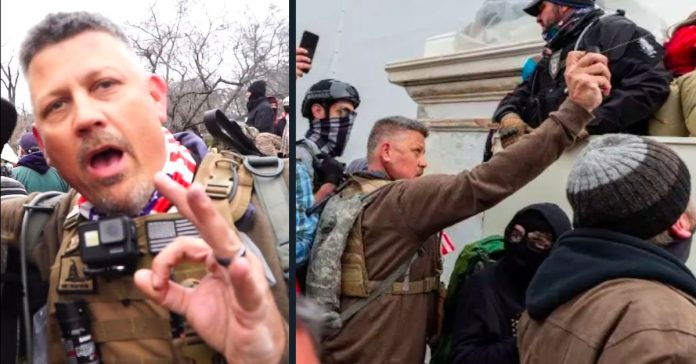
Christopher Worrell (via FBI court filings).
After going on the run and allegedly faking an overdose to avoid serving time for, among other charges, assaulting police at the U.S. Capitol on Jan. 6, 2021, Florida Proud Boy Chris Worrell was finally sentenced Thursday to 120 months, or 10 years in prison.
Worrell, 51, appeared before Senior U.S. District Judge Royce Lamberth in Washington, D.C., for a bench trial that stretched less than a week last May. He was convicted by the Ronald Reagan appointee of civil disorder, assaulting, resisting and impeding officers while using a dangerous weapon, obstruction of an official proceeding, physical violence in the Capitol and more.
In addition to the sentence, per a statement from the Justice Department obtained by Law&Crime, Lamberth also ordered Worrell to 36 months of supervised release, restitution of $2,000, and a $610 special assessment.
Worrell was facing significant prison time even before the dramatics of his disappearance. Prosecutors had initially requested a sentence of 14 years. That was deemed to be among “the low end of the applicable guidelines,” which reached up to 17 1/2 years. Worrell asked for 12 to 18 months, seeking sympathy from the court for a health condition.
In text messages obtained by prosecutors at trial, Lamberth saw Worrell boast about the assault, saying he used a “whole can” of pepper gel on police and was “f—— handing it to them,” on Jan. 6.
Days before he was due to report for his sentence in August, Worrell disappeared. Then, in late September, after a national manhunt had been underway for weeks, Worrell was found trying to sneak back into his home in Naples, Florida. With his property surrounded, police said they found him unconscious inside with survivalist gear and $4,000 cash on hand.
Prosecutors told the judge after Worrell was caught that they learned he “had no intention of ever turning himself in” and that the Proud Boy admitted to faking a drug overdose prior to his arrest.
His performance landed him in the hospital for five days — the same length of his bench trial, incidentally — and with medical staff catering to him and protection ordered from the Collier County Sheriff’s Office since he was in a non-secure location, his phony overdose racked up real costs, prosecutors argued.
In an email obtained by prosecutors after he was nabbed in Naples, Worrell was seen writing to someone identified as “B.S.” that the overdose wasn’t real.
When “B.S.” asked him if he had tried to kill himself, Worrell assured him: “I did not! Will explain more when we talk. I already told you some of it[.]”
“I have never and will never lie to you,” he added. “It was a stupid delay tactic. Will tell you more when we talk.”
Lamberth had allowed Worrell to remain on pretrial release so he could pursue medical treatment for non-Hodgkin’s lymphoma, an often curable form of cancer typically found in the lymph nodes. When Worrell was initially detained in October 2021, Lamberth held two D.C. jail officials in contempt of court for failing to comply with orders for Worrell’s care.
But once Worrell went on the run and faked the overdose, prosecutors urged Lamberth to reconsider those medical findings.
“Worrell has now admitted faking a drug overdose for strategic reasons,” a supplemental sentencing memorandum states. “And as the government has documented at length elsewhere, some of Worrell’s claims as to his medical treatment or conditions have been unsubstantiated by, or directly refuted by, medical records from at least a half-dozen different medical providers.”
This story is developing.
Have a tip we should know? [email protected]

